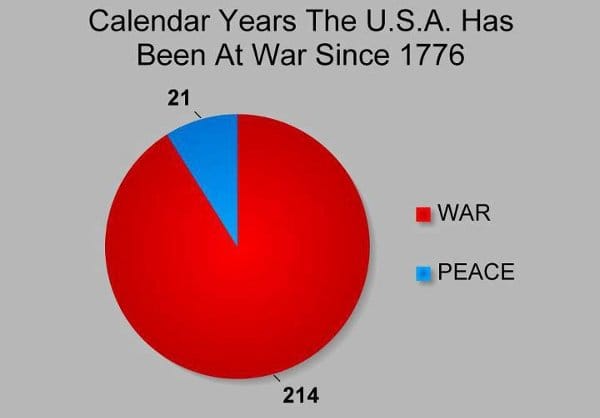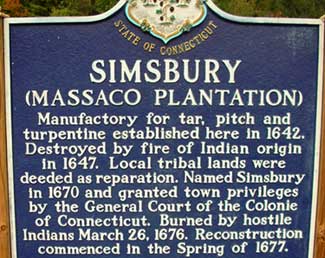United States Endless Wars: Started with King Philip's War


The warlike attitude of the US had its birth in King Philip's War, which predated the country and set it on its current militaristic path.
The United States has been at war almost continually since 1776. In the past 236 years we have been fighting some type of conflict for 214 years or about 90% of the time. The data in the graphic image was compiled from the Timeline of United States Military Operations on Wikipedia, which in turn used information up to 1975 from the House Committee on Foreign Affairs and doesn’t include CIA operations.
By most any standards we are a bellicose nation, seemingly ready to fight or invade most anyone anytime. Certainly World War II needed to be fought. But how many of the others did and what have we gained by fighting them?
Perhaps the most savage and vicious of all our wars was fought before the US was a country in what is now southern New England from 1675-1678. It set the stage for our future wars and attitudes. In terms of per capita deaths it was probably the bloodiest in US history. It was called King Philip’s War. The fighting was between English colonists and Indians. It was brutal and vicious on both sides. (The English erroneously thought Indian leader Metacomet was a king and for some reason called him King Philip, and the name stuck.)

The name of war: King Philip's War and the origins of American identity by Jill Lehore chronicles what happened during the war and more importantly, what happened after it. It affected our national consciousness and goals. The Google review says:
Lepore makes clear that it was after the war--and because of it--that the boundaries between cultures, hitherto blurred, turned into rigid ones. King Philip's War became one of the most written-about wars in our history, and Lepore argues that the words strengthened and hardened feelings that, in turn, strengthened and hardened the enmity between Indians and Anglos.
Before King Philip’s War relations between colonists and Indians were mostly cordial. After the war, everything polarized. Things increasingly were seen as black or white. Preachers like Cotton Mather fulminated against Indians, gaining popularity and power among colonists as he did. The new feeling was potential enemies had to be crushed, maybe even before they made a threatening move. Lepore suggests that this tragic war set the US on a course of uncompromising militarism which continues to this day.
Maybe it’s time to rethink that.


